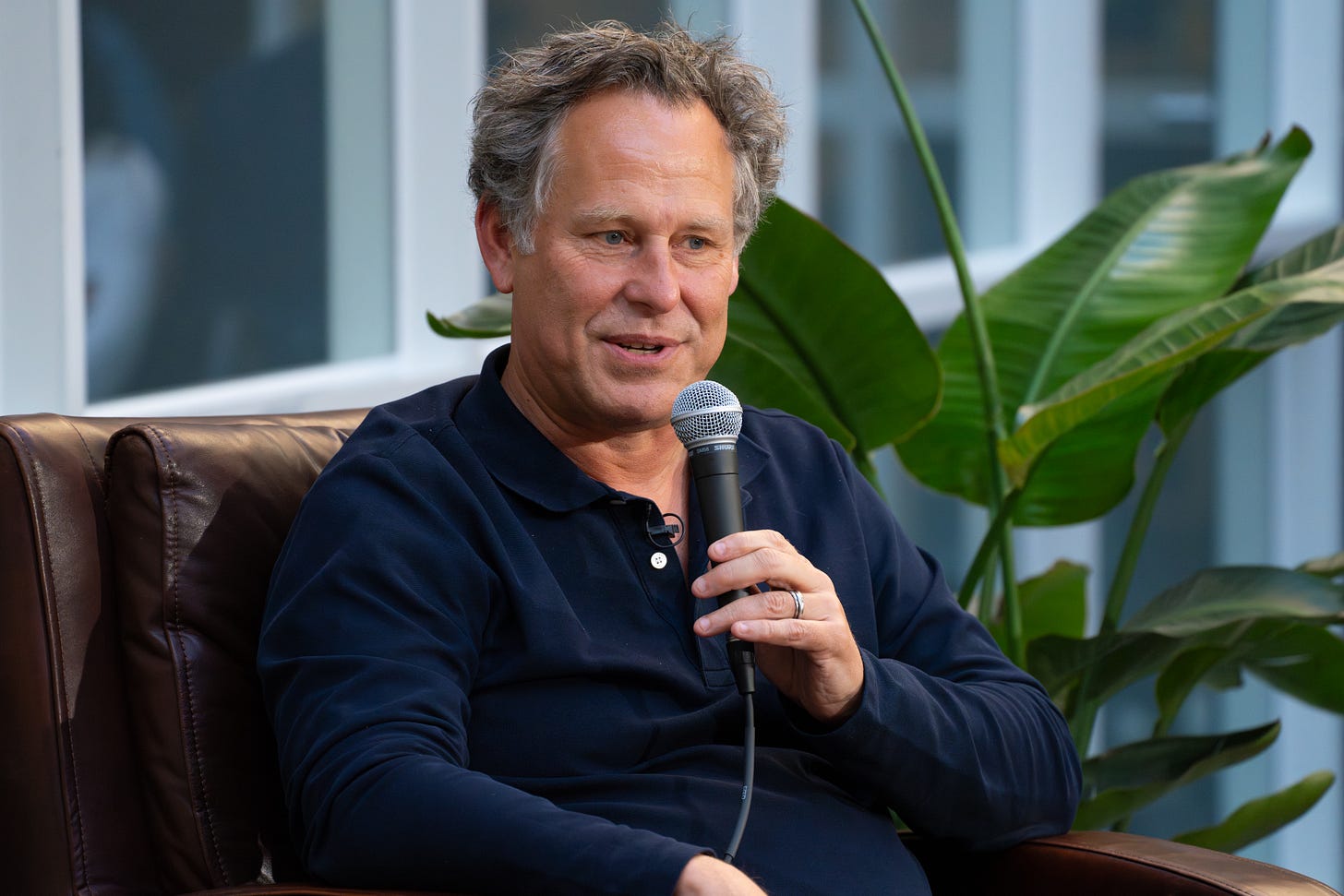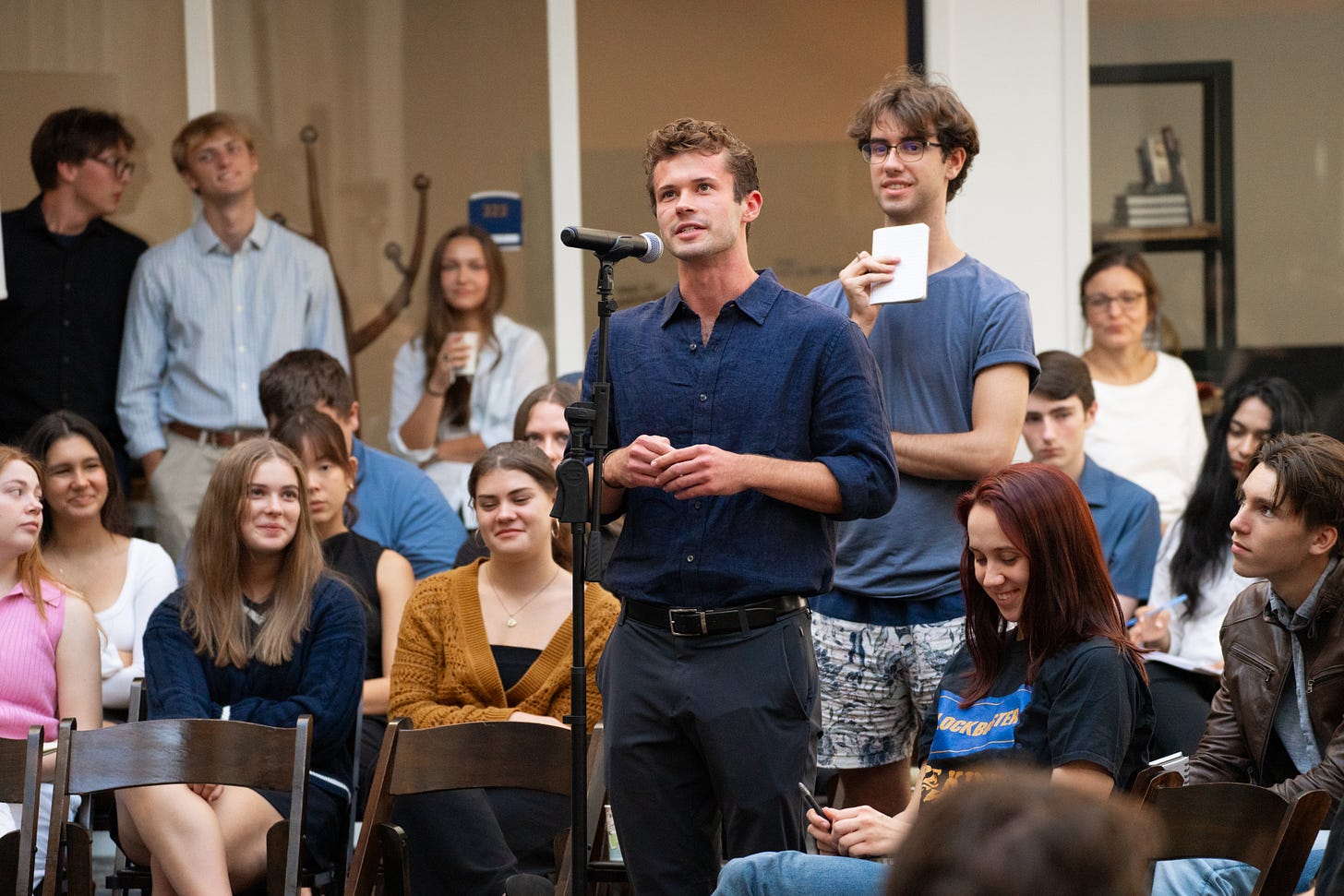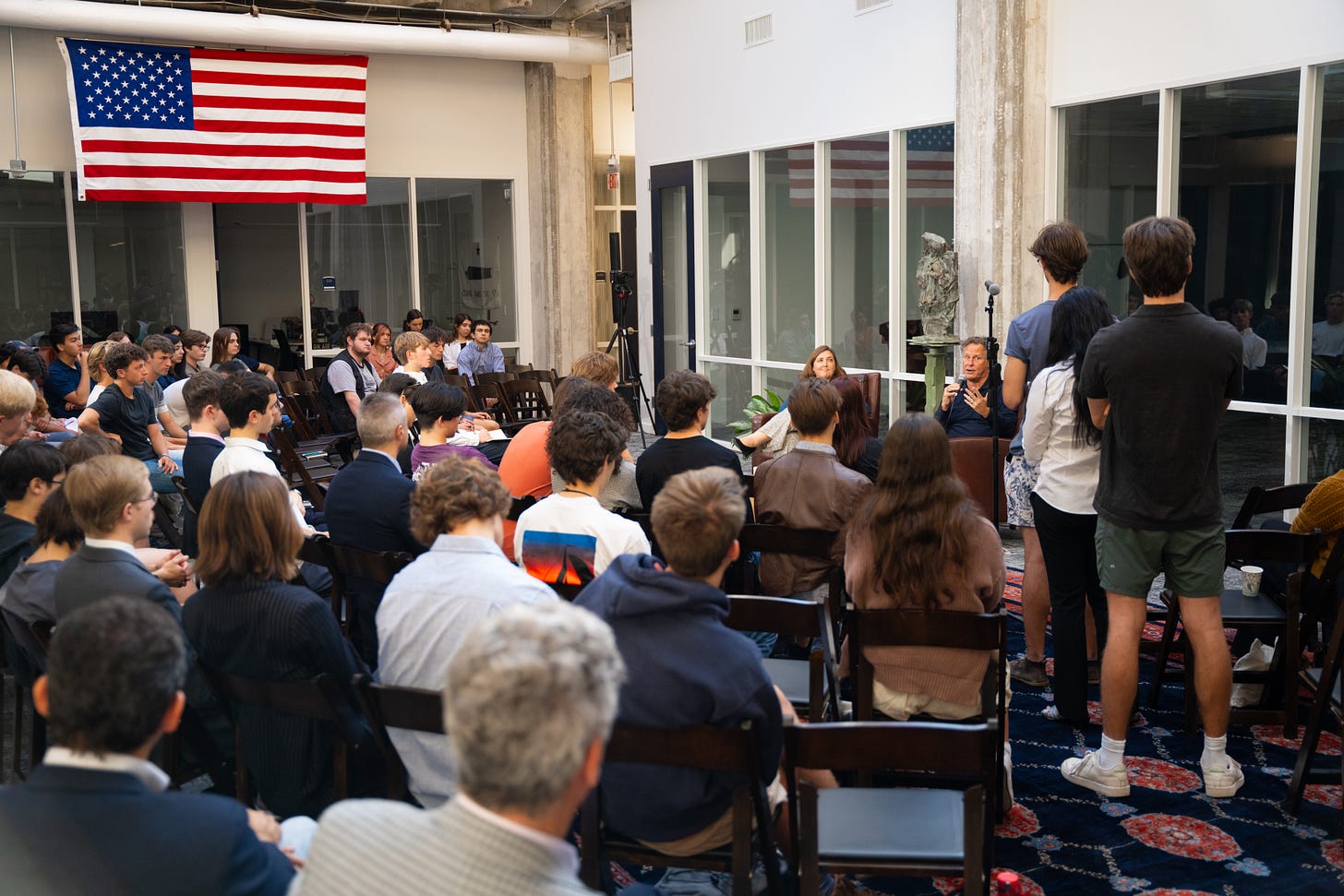Silicon Valley Founder and Investor: 'Lean Into Your Difference'
Mike Maples, Jr. told our students to focus on comparative rather than competitive advantage.
Legendary entrepreneur, venture capitalist, and bestselling author Mike Maples, Jr. visited our campus last week to discuss the power of difference and pattern-breaking ideas.
Maples is co-founder of Floodgate, a leading seed-stage fund in Silicon Valley, and an early investor in Twitter, Twitch, and Okta.
“There's not a recipe for creativity because there can't be a recipe for the undiscovered,” Maples told our students in a conversation with Chief Innovation Officer Keri Waters. “You can only have a recipe for something people know how to do.”
Maples advised students to “focus on your comparative advantage rather than your competitive advantage.”
“For example, what if everyone’s selling apples? Don't sell a ten times better apple,” he said. “Sell the world's first banana, and say, ‘Hey, look, you may not value the advantage of bananas, but for everyone who does, I'm the only guy who's got one.’
“Whenever you're radically different, somebody almost always values your difference. And only by being different can you make a difference. If you're the best version of yourself, you're impossible to compete with because there's only one of you.
“The best way to escape the competition trap is through uniqueness and authenticity.
“You have to be willing to depart from the consensus.”
Maples introduced the idea of “pattern breaking” as an exemplification of the power of difference in his new book Pattern Breakers: Why Some Start-Ups Change the Future.
“Pattern-breaking actions are the unconventional things people do to make their visions real,” he told UATX. “So if you're a founder with a pattern-breaking idea, it deviates from the present. It can't be reconciled with anything that's happened before. But if you sit out there by yourself in the future, nothing will happen.
“So you got to get people to join that different future with you. And they're not just going to do it on their own. You have to move them to a different future of your own design. So you're not just creating a pattern-breaking idea; you're creating a way to move those people to that different future. And then, over time, it becomes less of a heresy and more conventional wisdom.
“Sounds a little bit like the UATX story, honestly.”
Freshman Ramya Nambala said Maples’ words “resonated deeply with me; as at UATX, each student is encouraged to take a unique path.
“Being at UATX has fostered an environment where pattern breakers are likely to emerge who change the world.”
Associate Vice President of Students and Community Benjamin Crocker introduced Maples by drawing a parallel between the liberal arts and entrepreneurship, the two pillars of the UATX curriculum.
“Those two things are not mutually exclusive,” Crocker said. “They are supposed to talk to each other.
“Our entrepreneurs always have something to say about academics, and our academics always teach in an entrepreneurial spirit.
“When we're tracing through our Intellectual Foundations curriculum, you see great philosophers not always making tiny adaptions to things but giving us new systems to navigate the intellectual landscape,” he said. “So, there is an entrepreneurial quality to being a great academic and thinker.”
What’s more, both the Polaris program and the UATX principles of open inquiry and civil discourse prepare students to follow Maples’ call to challenge the consensus.
“At the very heart of what we're trying to do at the University of Austin is to understand what it means to be a builder, what it means to be an entrepreneur, what it means to be a pattern breaker,” Crocker said.
Learned Opinions
UATX academic leaders on perennial and timely topics.
→ Provost Jacob Howland wrote in Unherd on “What Jews Can’t Afford to Forget”:
The attacks of October 7 have stirred in the Jews — Hasidic and atheistic; Ashkenazi, Mizrahi, and Sephardic; Indian, Chinese, Australian, and American — what Lincoln called “the mystic chords of memory.” Today, in an existential crisis that may turn out to be the denouement of the central drama of Western civilisation, these unwilling protagonists — the whole people of Israel — are determined to defend themselves and the light they carry.
→ Assistant Professor of Literature Clay Greene interviewed Jacob Howland on “The Odyssey of Liberal Education” on Greene’s “Who Needs Western Civ” podcast:
Greene spoke of enigmatic lines from the Book of Genesis:
There are lines from Genesis 2 and 3 that puzzle me endlessly and also kind of put a chill down my spine. One of them is the end of Genesis 2: ‘They were naked, and they were not ashamed.’ The implications of that are hard even to ponder.
And then, of course: “They knew that they were naked.”
What is it to achieve shame? What is that state they’ve then entered into?
It seems to me the Biblical writers were either saying more than they knew or they knew more than they were saying.
Howland emphasized the importance of interpretation and the meaning of the classics:
Interpretation is the fundamental intellectual skill. I don’t care if you’re reading a book or looking at a chest X-ray; you have to sift noise from signal. You’ve got to be able to understand what’s in front of you. …
We’ve designed the Intellectual Foundations course at the University of Austin around fundamental questions and great classic books (old books interspersed with new ones) so that students will have the equipment they need, intellectually and spiritually, to rebuild our institutions and repair civilization. That requires a connection with the past. …
We study classics, whether it’s Huckleberry Finn, the Hebrew Scriptures, or what have you. A classic is a work that proves its vitality by its regenerative capabilities. And that’s what I mean about being nourished by the tradition.
Coming Soon
Want to sample a UATX philosophy seminar? Watch Associate Professor of Political Philosophy Alex Priou on a panel discussing the interpretation of Plato’s Symposium by the great 20th-century political philosopher Leo Strauss. The event is free, virtual, and open to the public.
Register here.
The University of Austin has opened applications for the Class of 2029, our next cohort of scholars and builders.
And there’s more.
Thanks to the continued generosity of our donors, each student in the Class of 2029 will be awarded a Founders Scholarship covering the full cost of undergraduate tuition for four years.
That’s a value of approximately $130,000.
→ Schedule a visit at our Scarbrough campus to sit in on classes, meet an Admissions officer, and more.
→ Find more information and FAQs on the UATX Admissions website.

Maggie Kelly is the Communications Manager at the University of Austin. Write to her at mkelly@uaustin.org.








💯
Academia is rotten throughout, no doubt. There are many innovative ways to teach better and to make credentials less expensive and more reflective of merit. I loved my time in the '80s in and near Austin, from 5th grade through high-school graduation. I'm more conservative than most of the faculty, my family has founded and run some of the top US universities over the past 200+ years, such as the U Penn med school and the U of R.I., I've been reading my U. Chicago great books set since I was 5.
But after spending all day reading up on UATX, its board, administration, faculty, policies and courses, really wanting to be enthusiastic about it ... it's not good. Faculty: 18 humanities, 4 economists, 4 math / CS, no real scientists or engineers. Over 40 administrators, even HR, plus the 8 generally repellent board members - no contact informaton listed for them. No transfer credits, no tenure, over $20k/yr. in non-tuition expenses, $53k total, no innovation in assessments, onerous policies drafted to comply with foolish federal policies and eligibility to suck at the federal teat, extremely limited course selection, the innovation project unit and its director are bad jokes, no lab facilities, no biological science or chemistry, 2/3 of a year of high school physics, no electronics, one sketchy law course ... honestly, many community colleges offer a better education in just about every way.